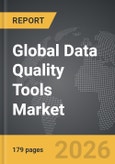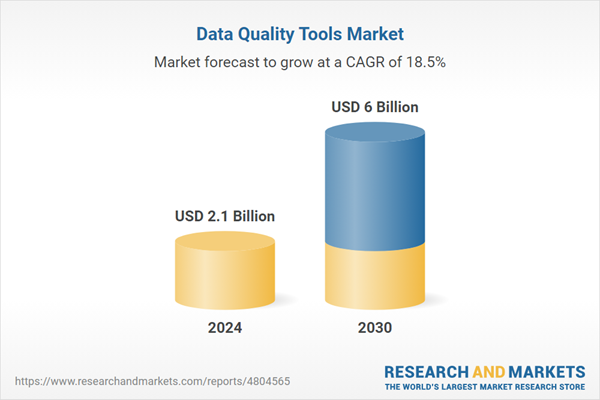Global Data Quality Tools Market - Key Trends and Drivers Summarized
What Are Data Quality Tools and How Do They Enhance Business Operations?
Data quality tools are software applications designed to ensure that an organization's data is accurate, complete, consistent, and relevant. These tools are critical for businesses that rely on data for decision-making, reporting, and strategic planning. By identifying, correcting, and preventing errors and inconsistencies in data, these tools help maintain the integrity of data throughout its lifecycle. This process not only supports operational efficiency but also enhances reliability in business analytics and intelligence systems, leading to better-informed decisions. Effective data management with quality tools reduces risks, improves customer satisfaction, and increases profitability by ensuring that key business decisions are based on reliable and accurate information.How Do Data Quality Tools Function Across Different Data Environments?
Data quality tools operate by integrating with existing data systems to continuously monitor, cleanse, and manage data. They employ a variety of techniques such as parsing, data matching, data profiling, and cleansing to detect inaccuracies and inconsistencies. For instance, these tools can automatically correct commonly misspelled words, unify date formats, and standardize address information across customer databases. In more complex data environments that involve big data or data streaming from multiple sources, these tools are capable of handling large volumes at high velocity, ensuring that the data quality is maintained across diverse platforms and databases. This functionality is crucial for organizations that operate in dynamic markets where the accuracy and timeliness of information are key to maintaining competitive advantages.What Challenges Are Addressed by Implementing Data Quality Tools?
Implementing data quality tools addresses several challenges that organizations face in data management. The primary challenge is ensuring data accuracy in an era where the volume of data is increasing exponentially. Poor data quality can lead to significant consequences such as lost revenue, misinformed business strategies, and decreased customer satisfaction. Furthermore, compliance with regulatory requirements like GDPR in Europe or HIPAA in the United States necessitates high data quality standards to avoid legal penalties and reputational damage. Data quality tools also help in resolving issues of data silos within organizations by ensuring that data across various departments is consistent and uniformly accessible, which is essential for holistic analysis and reporting.What Drives the Growth in the Data Quality Tools Market?
The growth in the data quality tools market is driven by several factors, starting with the increasing reliance of businesses on data-driven decision-making. As organizations continue to digitalize their operations, the need for high-quality data becomes imperative to ensure accuracy in analytics and business intelligence. Additionally, the surge in data generated from diverse sources such as IoT devices, online transactions, and customer interactions has heightened the demand for robust data quality solutions that can manage complexity and scale. Regulatory pressures for data compliance also compel businesses to invest in data quality tools to ensure they meet industry standards and avoid penalties. Moreover, as businesses recognize the significant cost of poor data quality in terms of lost opportunities and inefficiencies, there is a growing awareness and proactive investment in data quality tools. These technological, economic, and regulatory factors collectively fuel the expansion of the data quality tools market, highlighting their critical role in enhancing the integrity and reliability of business data.Report Scope
The report analyzes the Data Quality Tools market, presented in terms of market value (USD). The analysis covers the key segments and geographic regions outlined below.- Segments: Data Type (Financial Data, Customer Data, Product Data, Compliance Data, Supplier Data); Component (Software, Services).
- Geographic Regions/Countries: World; United States; Canada; Japan; China; Europe (France; Germany; Italy; United Kingdom; and Rest of Europe); Asia-Pacific; Rest of World.
Key Insights:
- Market Growth: Understand the significant growth trajectory of the Software Component segment, which is expected to reach US$3.2 Billion by 2030 with a CAGR of 17.2%. The Services Component segment is also set to grow at 20.2% CAGR over the analysis period.
- Regional Analysis: Gain insights into the U.S. market, valued at $581.8 Million in 2024, and China, forecasted to grow at an impressive 17.2% CAGR to reach $888.2 Million by 2030. Discover growth trends in other key regions, including Japan, Canada, Germany, and the Asia-Pacific.
Why You Should Buy This Report:
- Detailed Market Analysis: Access a thorough analysis of the Global Data Quality Tools Market, covering all major geographic regions and market segments.
- Competitive Insights: Get an overview of the competitive landscape, including the market presence of major players across different geographies.
- Future Trends and Drivers: Understand the key trends and drivers shaping the future of the Global Data Quality Tools Market.
- Actionable Insights: Benefit from actionable insights that can help you identify new revenue opportunities and make strategic business decisions.
Key Questions Answered:
- How is the Global Data Quality Tools Market expected to evolve by 2030?
- What are the main drivers and restraints affecting the market?
- Which market segments will grow the most over the forecast period?
- How will market shares for different regions and segments change by 2030?
- Who are the leading players in the market, and what are their prospects?
Report Features:
- Comprehensive Market Data: Independent analysis of annual sales and market forecasts in US$ Million from 2024 to 2030.
- In-Depth Regional Analysis: Detailed insights into key markets, including the U.S., China, Japan, Canada, Europe, Asia-Pacific, Latin America, Middle East, and Africa.
- Company Profiles: Coverage of players such as Informatica LLC, Information Builders, Inc., Microsoft Corporation, Oracle Corporation, Pitney Bowes, Inc. and more.
- Complimentary Updates: Receive free report updates for one year to keep you informed of the latest market developments.
Some of the 12 companies featured in this Data Quality Tools market report include:
- Informatica LLC
- Information Builders, Inc.
- Microsoft Corporation
- Oracle Corporation
- Pitney Bowes, Inc.
- SAP SE
- SAS Institute, Inc.
- Syncsort
- Talend SA
- Tamr
- Trianz, Inc.
- Experian PLC
- IBM Corporation
This edition integrates the latest global trade and economic shifts into comprehensive market analysis. Key updates include:
- Tariff and Trade Impact: Insights into global tariff negotiations across 180+ countries, with analysis of supply chain turbulence, sourcing disruptions, and geographic realignment. Special focus on 2025 as a pivotal year for trade tensions, including updated perspectives on the Trump-era tariffs.
- Adjusted Forecasts and Analytics: Revised global and regional market forecasts through 2030, incorporating tariff effects, economic uncertainty, and structural changes in globalization. Includes historical analysis from 2015 to 2023.
- Strategic Market Dynamics: Evaluation of revised market prospects, regional outlooks, and key economic indicators such as population and urbanization trends.
- Innovation & Technology Trends: Latest developments in product and process innovation, emerging technologies, and key industry drivers shaping the competitive landscape.
- Competitive Intelligence: Updated global market share estimates for 2025, competitive positioning of major players (Strong/Active/Niche/Trivial), and refined focus on leading global brands and core players.
- Expert Insight & Commentary: Strategic analysis from economists, trade experts, and domain specialists to contextualize market shifts and identify emerging opportunities.
Table of Contents
Companies Mentioned (Partial List)
A selection of companies mentioned in this report includes, but is not limited to:
- Informatica LLC
- Information Builders, Inc.
- Microsoft Corporation
- Oracle Corporation
- Pitney Bowes, Inc.
- SAP SE
- SAS Institute, Inc.
- Syncsort
- Talend SA
- Tamr
- Trianz, Inc.
- Experian PLC
- IBM Corporation
Table Information
| Report Attribute | Details |
|---|---|
| No. of Pages | 179 |
| Published | February 2026 |
| Forecast Period | 2024 - 2030 |
| Estimated Market Value ( USD | $ 2.1 Billion |
| Forecasted Market Value ( USD | $ 6 Billion |
| Compound Annual Growth Rate | 18.5% |
| Regions Covered | Global |









